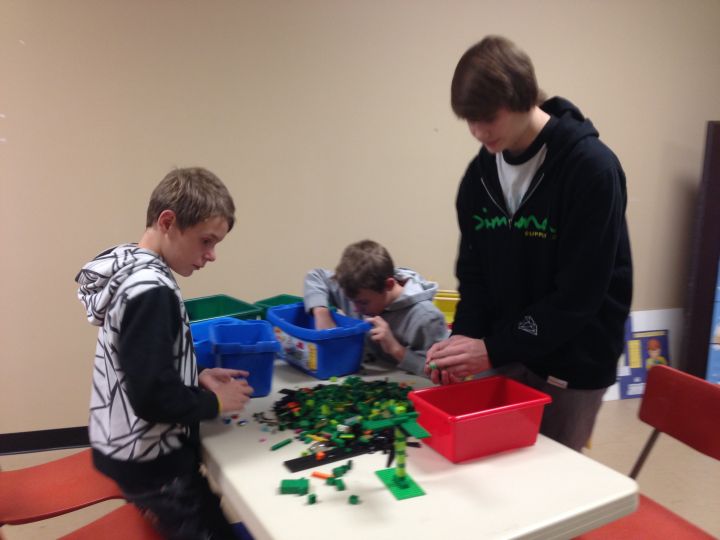EDMONTON – It’s a popular toy almost every person played with as a child, but a local program has proven Lego can also be a very beneficial therapy tool for children who live with mental health issues.

“I just say ‘we go to Lego so we can have the building blocks to give you the building blocks,'” said Chris Parlee, whose twin boys are enrolled in the Lego-Social Skills Group in St. Albert.
Tyler and Tyson Burns have Fetal Alcohol Spectrum Disorder (FASD). Parlee says her sons don’t follow rules well, and she was looking for a therapy program for them that wasn’t too structured, but just structured enough that they could learn basic social skills like sharing.
“They need to have slower-paced, simple instruction,” Parlee explained. “The Lego gives them that.”
So she signed her boys up for Lego Therapy, led by Registered Nurse Dyan Eybergen. The therapy focuses on children with mental health issues, and helps them improve their social skills.
“A lot of them come in and they’re so lacking in social skills that we see a lot of parallel play; they’ll play around each other, they’ll play beside each other, but they won’t play with each other,” Eygerben explained.

Get weekly health news
Lego Therapy was developed more than 15 years ago by a doctor in New Jersey, after noticing that children with autism and other neurobehavioural disorders were naturally attracted to the colourful building blocks.
- ‘Alarming trend’ of more international students claiming asylum: minister
- Canadian government’s satellite deal has Tories calling for Elon Musk involvement
- Justin Trudeau headed to UN Summit of the Future amid international instability
- Activists call for Boogie the monkey to be removed from Ontario roadside zoo
“It naturally re-enforces social behaviour. Because they have this affinity for Lego, because they love playing with it, they have to cooperate, they have to work with one another in order to build something and accomplish something,” Eygergen explained.
Each therapy session begins with the children breaking off into groups of three, and with the help of a teenage leader, the small groups focus on peer interaction.
“They take turns being Lego leaders, Lego engineers, Lego sorters, Lego builders and we rotate every 15 minutes. So in that dynamic, they learn turn-taking and collaboration skills, problem solving skills when they come up with an issue, leadership skills as they’re following instructions, transitioning from one role to another role,” Eygerben said. “And it’s all through practice that they learn how to interact with one another in socially appropriate ways.”
After that, the children come together for free Lego-building time, which is a bit less structured.
“We really encourage self-initiated peer contact, we look for communication, we do a lot of conflict resolution during that time,” Eygerben explained.
She says the group work gives the children time to learn how to invite others to play, and be open to other children’s ideas of play.
“They start to self-soothe and calm themselves much quicker than when they first come to us.”
Parlee says she’s noticed a huge difference in her boys’ behaviour since they started the program over the summer.
“They had learned how to share. And it wasn’t like they’re perfect, but you could hear them at home saying ‘you’re not supposed to take that from me. You’re supposed to ask nicely. How do you think I feel?'”
Parlee says Lego Therapy has not only helped the boys with their social skills, it’s also helped them build confidence.
“When they first met Dyan, I think we sat for an hour in a coffee shop and I think if she got three words out of them she was lucky. Now, they’ll approach people, they’ll say ‘hello, this is who I am.’ They’re polite,” she explained with a smile. “Just because they have a disability, just because they’re not like everybody else, doesn’t mean they can’t fit in. You want them to learn that.
“Just even knowing that they’re coming to a place and they can identify to a peer group boosts their self esteem. It’s incredible to watch.”
Lego Therapy is also offered at Terwillegar Recreation Centre. When Eygerben started the program in 2012, there were just four children enrolled. Now, she’s got a waiting list.
In order to keep up with the demand, Eygerben is running a crowdfunding campaign through Alberta BoostR. She’s trying to raise $5,000 to purchase more Lego and create a subsidy program to reach families who may not be able to afford program fees.
For more information, visit Alberta BoostR’s website.
With files from Su-Ling Goh, Global News.








Comments